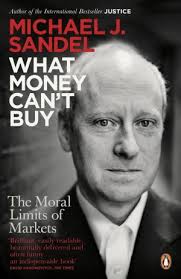A week ago I wrote about the most effective and illuminating hoax I ever pulled on my students. Here’s what we learned from it . . .
In a recent post I described a proposal concerning access to my services that I proposed to my students during a recent course.
 We were studying Michael Sandel’s What Money Can’t Buy, an exploration of how in our contemporary world market economies are generating market societies, societies in which ideas and values that have traditionally been considered as outside or above being reduced to numbers and dollar signs are gradually being sucked into the vortex of market activity. Everything, even the most revered and sacred activities, is up for sale. For general class discussion, I created a hypothetical scenario that I hoped would resonate with the group—student access to faculty time.
We were studying Michael Sandel’s What Money Can’t Buy, an exploration of how in our contemporary world market economies are generating market societies, societies in which ideas and values that have traditionally been considered as outside or above being reduced to numbers and dollar signs are gradually being sucked into the vortex of market activity. Everything, even the most revered and sacred activities, is up for sale. For general class discussion, I created a hypothetical scenario that I hoped would resonate with the group—student access to faculty time.
To set my proposal up, I described for my students how at various times during the semester student demand on my expertise and time often becomes very heavy. Specifically, my long-standing offer to read a couple of pages of students’ rough draft material up to a week before a major paper is due, drafts that I read on a first-come, first-served basis, creates a log-jam rivaled only by the queue outside my door during office hours in the days before a major assignment is due or an exam takes place. In the interest of streamlining the process and making my time most directly available to those who want it the most, I made the following proposal:
 At the beginning of each semester, my students will have the opportunity to purchase a Morgan Preferred-Access Pass for $250, a purchase that will provide a student with the following semester-long benefits:
At the beginning of each semester, my students will have the opportunity to purchase a Morgan Preferred-Access Pass for $250, a purchase that will provide a student with the following semester-long benefits:
- Your rough-draft material will be read, commented on, and returned within six hours of receipt (unless it was submitted between midnight and 6:00 AM), even when there are several rough draft submissions ahead of yours that have not yet been read. Your Preferred-Access Pass, in other words, entitles you to the privilege of jumping to the front of the e-line.
- Your Preferred-Access Pass also entitles you to jump to the head of the line outside my door during office hours for one-on-one conversation with me.
- Your Preferred-Access Pass is transferable. For instance, if you believe that you are in good shape on a particular assignment and do not need my help or expertise, you may rent your Preferred-Access Pass to a fellow student lacking such a pass to use for that assignment only.
- Please Note: Your Pass gains you preferred access to me by jumping the queue—it does not guarantee any particular grade on any given assignment.
After walking the students through the details of my proposal, I put them in small groups to discuss the ideas involved, reminding them to apply two tools Sandel identified as useful when testing such proposals with market creep in mind. Is there a problem of fairness involved? Is there a problem of corruption involved?
When we reconvened after ten minutes or so of group activity, it was clear that the students had taken my proposal very seriously, and they were not pleased with it. At all. It was a matter of figuring out what was at the core of their intuition that something was seriously wrong with this proposal.  Soon various challenges were raised.
Soon various challenges were raised.
What about students who can’t afford the $250?
To which “Market Me” responded “What about them?” This is the way the market works—those who want what’s for sale badly enough will find a way to come up with the asking price. After all, if I tell a car salesperson that I really, really want the $50,000 car on the lot but only have $5,000 to spend, I will be told “too bad!” But someone pointed a possible difference—what I have for sale in my proposal is different from a car. What I have put up for sale is something that arguably should be equally available to everyone, regardless of ability to pay. There’s a problem of fairness, in other words.
Aren’t you already getting paid to provide access to students? We’ve already paid for access to you with our tuition money.
This prompted my providing my students with a peek into the world of a faculty member. Yes I am getting paid to provide access to students, to the tune of a required three or four announced office hours per week.  And that’s what your tuition is paying for. But my practice of reading rough draft material is above and beyond the call of contract and duty. Indeed, many of my faculty colleagues have pointed out the insanity of voluntarily taking on such a time consuming task, given the already enormous time challenges of college teaching. So I’m willing to amend my proposal—office hours will remain first-come, first-served, but preferred rough draft access will be for sale. And by the way, I am still committed to providing access to all of my students, even those who do not purchase the all-access pass. My proposal just adjusts the dynamic of that access.
And that’s what your tuition is paying for. But my practice of reading rough draft material is above and beyond the call of contract and duty. Indeed, many of my faculty colleagues have pointed out the insanity of voluntarily taking on such a time consuming task, given the already enormous time challenges of college teaching. So I’m willing to amend my proposal—office hours will remain first-come, first-served, but preferred rough draft access will be for sale. And by the way, I am still committed to providing access to all of my students, even those who do not purchase the all-access pass. My proposal just adjusts the dynamic of that access.
Making extra money for yourself in this way makes you look sort of like a jerk.
Really? I’m just trying to make a buck here! But to keep the discussion moving, I asked whether they would feel better if I set up a ![]() PayPal account and the $250 went directly to the Providence College General Scholarship Fund. Everyone agreed that this would solve this particular problem; I even got the impression that with this adjustment several students would give a thumbs-up to the amended proposal.
PayPal account and the $250 went directly to the Providence College General Scholarship Fund. Everyone agreed that this would solve this particular problem; I even got the impression that with this adjustment several students would give a thumbs-up to the amended proposal.
But they shouldn’t, because even if the money is shifted away from me toward a “good cause,” access to me has still been commodified. The fact that the $250 is going to the scholarship fund rather than my checking account does not remove the fact that my time is for sale.  And if I’m still a “jerk” for even coming up with this idea, we need to figure out why. What exactly is at risk here? What important value would be demeaned and corroded if this policy were put in place?
And if I’m still a “jerk” for even coming up with this idea, we need to figure out why. What exactly is at risk here? What important value would be demeaned and corroded if this policy were put in place?
I’m concerned that even though you say you will still give access to everyone, you will unintentionally stop paying as much attention to those without a pass, even when you aren’t backlogged.
A corruption problem in other words—a value is being damaged by its being placed on the market. This gave me the opportunity to introduce a way of thinking about education that many professed to be unaware of—the business model. What if we think of higher education institutions as putting a product up for sale, a product that students are purchasing with their tuition? What is the product?  How would the buyer be able to tell if their purchase was a good one?
How would the buyer be able to tell if their purchase was a good one?
As we talked about the business model of education, many students admitted that they do think of their four years at Providence College as something they have purchased with another end in mind, most likely a good job, a comfortable lifestyle, and the very happiness that we all claim that money can’t buy. “How are you able to tell if your purchase has been worth it?” I asked. With a bit of prodding, some admitted that their parents at least consider a low grade at the end of the semester to be evidence of a bad investment. Not only education but family relationships themselves start being judged with market categories. Finally, someone said what had been lurking beneath the surface throughout the discussion.
Students are supposed to love learning for the sake of learning, not for the sake of what they can get with it.
That such a statement is often immediately dismissed as idealistic and naïve is an indication of just how far down the market road of no return we have already travelled in our culture. But my students, although they admitted that they often ignore this conviction about education when buried under papers, exams, and stress about the future, all agreed that whatever the value is that is at risk of being corrupted in my modest proposal, “the love of learning” captures at least a portion of it.
Almost two years ago, in one of my many reflections on teaching in this blog, I wrote the following:
The whole process of teaching and learning, when liberated from my frequent well-meaning but misguided attempts to shape and control it, has transcendent energy behind it. This all sounds idealistic and impractical in a world where the value of higher education is often exclusively identified as and judged according to the standard of focused (and very expensive) job preparation. Maybe so—practicality has never been my strong suit. But identifying the tools of lifetime learning and honing skilled use of these tools through engagement with the greatest texts that human beings have produced is an activity whose importance transcends the size of one’s future paycheck.
Thanks to my students’ discussion of my modest proposal, I am once again reminded that at its heart, education should not be for sale. It’s too valuable for that.












